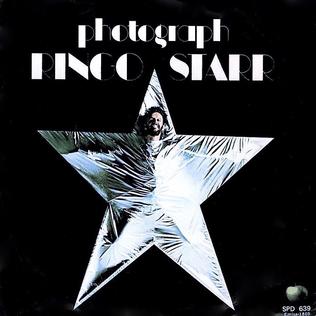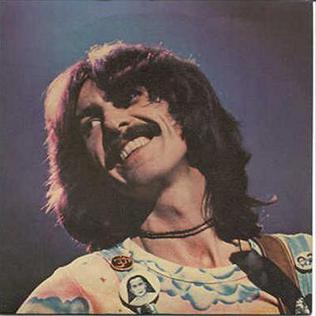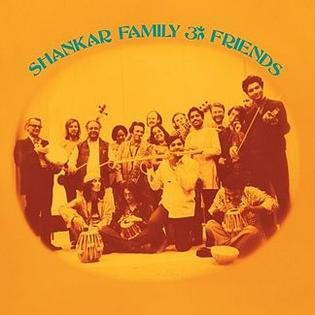
The Concert for Bangladesh was a pair of benefit concerts organised by former Beatles guitarist George Harrison and Indian sitar player Ravi Shankar. The shows were held at 2:30 and 8:00 pm on Sunday, 1 August 1971, at Madison Square Garden in New York City, to raise international awareness of, and fund relief for refugees from East Pakistan, following the Bangladesh Liberation War-related genocide and the 1970 Bhola cyclone. The concerts were followed by a bestselling live album, a boxed three-record set, and Apple Films' concert documentary, which opened in cinemas in the spring of 1972.

Extra Texture (Read All About It) is the sixth studio album by the English musician George Harrison, released on 22 September 1975. It was Harrison's final album under his contract with Apple Records and EMI, and the last studio album issued by Apple. The release came nine months after his troubled 1974 North American tour with Ravi Shankar and the poorly received Dark Horse album.

Dark Horse is the fifth studio album by the English rock musician George Harrison. It was released on Apple Records in December 1974 as the follow-up to Living in the Material World. Although keenly anticipated on release, Dark Horse is associated with the controversial North American tour that Harrison staged with Indian classical musician Ravi Shankar in November and December that year. This was the first US tour by a member of the Beatles since 1966, and the public's nostalgia for the band, together with Harrison contracting laryngitis during rehearsals and choosing to feature Shankar so heavily in the programme, resulted in scathing concert reviews from some influential music critics.

Wonderwall Music is the debut solo album by the English musician George Harrison and the soundtrack to the 1968 film Wonderwall, directed by Joe Massot. Released in November 1968, it was the first solo album by a member of the Beatles, and the first album issued on the band's Apple record label. The songs are all instrumental pieces, except for occasional non-English language vocals, and mostly comprise short musical vignettes. Following his Indian-styled compositions for the Beatles since 1966, he used the film score to further promote Indian classical music by introducing rock audiences to instruments that were relatively little-known in the West – including shehnai, sarod, tar shehnai, tanpura and santoor. The Indian pieces are contrasted by Western musical selections, in the psychedelic rock, experimental, country and ragtime styles.
The discography of English singer-songwriter and former Beatle George Harrison consists of 12 studio albums, two live albums, four compilation albums, 35 singles, two video albums and four box sets. Harrison's first solo releases – the Wonderwall Music film soundtrack (1968) and Electronic Sound (1969) – were almost entirely instrumental works, issued during the last two years of the Beatles' career. Following the band's break-up in April 1970, Harrison continued to produce recordings by his fellow Apple Records acts, notably former bandmate Ringo Starr. He recorded and collaborated with a wide range of artists, including Shankar, Bob Dylan, Eric Clapton and Gary Wright.

"Photograph" is a song by English rock musician Ringo Starr that was released as the lead single from his 1973 album Ringo. Starr co-wrote it with George Harrison, his former bandmate from the Beatles. Although they collaborated on other songs, it is the only one officially credited to the pair. A signature tune for Starr as a solo artist, "Photograph" was an international hit, topping singles charts in the United States, Canada and Australia, and receiving gold disc certification for US sales of 1 million. Music critics have similarly received the song favourably; Stephen Thomas Erlewine of AllMusic considers it to be "among the very best post-Beatles songs by any of the Fab Four".

"You" is a song by English musician George Harrison, released as the opening track of his 1975 album Extra Texture . It was also the album's lead single, becoming a top 20 hit in America and reaching number 9 in Canada. A 45-second instrumental portion of the song, titled "A Bit More of You", appears on Extra Texture also, opening side two of the original LP format. Harrison wrote "You" in 1970 as a song for Ronnie Spector, formerly of the Ronettes, and wife of Harrison's All Things Must Pass co-producer Phil Spector. The composition reflects Harrison's admiration for 1960s American soul/R&B, particularly Motown.
"That Is All" is a song by English musician George Harrison released as the final track of his 1973 album Living in the Material World. A slow, heavily orchestrated ballad, it is one of many Harrison love songs that appear to be directed at either a woman or a deity. Harrison wrote and recorded the song during the height of his public devotion to Hinduism; on release, Rolling Stone described its lyrics as "a sort of Hindu In Paradisium".

"Bangla Desh" is a song by English musician George Harrison. It was released as a non-album single in July 1971, to raise awareness for the millions of refugees from the country Bangladesh, formerly known as East Pakistan, following the 1970 Bhola cyclone and the outbreak of the Bangladesh Liberation War. Harrison's inspiration for the song came from his friend Ravi Shankar, an Indian-Bengali musician, who approached Harrison for help in trying to alleviate the suffering. "Bangla Desh" has been described as "one of the most cogent social statements in music history" and helped gain international support for Bangladeshi independence by establishing the name of the fledgling nation around the world. In 2005, United Nations Secretary-General Kofi Annan identified the song's success in personalising the Bangladesh crisis, through its emotive description of Shankar's request for help.

Raga is a 1971 documentary film about the life and music of Indian sitarist Ravi Shankar, produced and directed by Howard Worth. It includes scenes featuring Western musicians Yehudi Menuhin and George Harrison, as well as footage of Shankar returning to Maihar in central India, where as a young man he trained under the mentorship of Allauddin Khan. The film also features a portion of Shankar and tabla player Alla Rakha's acclaimed performance at the 1967 Monterey Pop Festival.
John Barham is an English classical pianist, composer, arranger, producer and educator. He is best known for his orchestration of George Harrison albums such as All Things Must Pass (1970) and for his association with Indian sitar maestro Ravi Shankar.
"Be Here Now" is a song by English rock musician George Harrison from his 1973 album Living in the Material World. The recording features a sparse musical arrangement and recalls Harrison's work with the Beatles during 1966–1968, through its Indian-inspired mood and use of sitar drone. Part of Harrison's inspiration for the song was the popular 1971 book Be Here Now by spiritual teacher Ram Dass – specifically, a story discussing the author's change in identity from a Western academic to a guru in the Hindu faith. Some Harrison biographers interpret "Be Here Now" as a comment from him on the public's nostalgia for the past following the Beatles' break-up.

"Deep Blue" is a song by English rock musician George Harrison that was released as the B-side to his 1971 charity single "Bangla Desh". Harrison wrote the song in 1970, midway through the recording sessions for All Things Must Pass, and recorded it in Los Angeles the following year while organising the Concert for Bangladesh. The composition was inspired by the deteriorating condition of his mother, Louise, before she succumbed to cancer in July 1970, and by Harrison's feelings of helplessness as he visited her in hospital in the north of England. Given the subject matter, "Deep Blue" also served to convey the suffering endured by the millions of refugees from war-torn Bangladesh in 1971, as sickness and disease became widespread among their makeshift camps in northern India.

"Hari's on Tour (Express)" is an instrumental by English musician George Harrison, released as the opening track of his 1974 album Dark Horse. It was also the B-side of the album's second single – which was "Ding Dong, Ding Dong" in North America and most other territories, and "Dark Horse" in Britain and some European countries. Among Harrison's post-Beatles solo releases, the track is the first of only two genuine instrumentals he released from 1970 onwards – the other being the Grammy Award-winning "Marwa Blues", from his 2002 album Brainwashed.
"Simply Shady" is a song by English musician George Harrison that was released on his 1974 album Dark Horse. The song addresses Harrison's wayward behaviour during the final year of his marriage to Pattie Boyd, particularly the allure of temptations such as alcohol and drugs over spiritual goals. Harrison said the song was about "what happens to naughty boys in the music business".

"Māya Love" is a song by English musician George Harrison, released on his 1974 album Dark Horse. The song originated as a slide guitar tune, to which Harrison later added lyrics relating to the illusory nature of love – maya being a Sanskrit term for "illusion", or "that which is not". Harrison's biographers consider the lyrical theme to be reflective of his failed marriage to Pattie Boyd, who left him for his friend Eric Clapton shortly before the words were written. Harrison recorded the song at his home, Friar Park, on the eve of his North American tour with Ravi Shankar, which took place in November and December 1974. The recording features Harrison's slide guitar extensively and contributions from four musicians who formed the nucleus of his tour band: Billy Preston, Tom Scott, Willie Weeks and Andy Newmark. Reviewers note the track as an example of its parent album's more diverse musical genres, namely funk and rhythm and blues, compared with the more traditional rock orientation of Harrison's earlier solo work.

Shankar Family & Friends is an album by Indian musician Ravi Shankar, recorded primarily in Los Angeles during the spring of 1973, but not released until late 1974. It was produced by Shankar's friend George Harrison and one of the first releases on the ex-Beatle's Dark Horse label. Out of print for many years, and much sought after as a result, the album was remastered in 2010 and reissued as part of the Ravi Shankar–George Harrison box set Collaborations.

Chants of India is an album by Indian musician Ravi Shankar released in 1997 on Angel Records. Produced by his friend and sometime collaborator George Harrison, the album consists of Vedic and other Hindu sacred prayers set to music, marking a departure from Shankar's more familiar work in the field of Hindustani classical music. The lyrical themes of the recorded chants are peace and harmony among nature and all creatures. Sessions for the album took place in the Indian city of Madras and at Harrison's home in Henley-on-Thames, Oxfordshire, following his work on The Beatles' Anthology (1995). Anoushka Shankar, John Barham, Bikram Ghosh, Tarun Bhatacharaya and Ronu Majumdar are among the many musicians who contributed to the recording.

Joi Bangla is an EP by Indian sitar virtuoso Ravi Shankar, issued in August 1971 on Apple Records. The recording was produced by George Harrison and its release marked the first in a series of occasional collaborations between the two musicians that lasted until the Chants of India album in 1997. Shankar recorded the EP in Los Angeles, to help raise international awareness of the plight faced by refugees of the Bangladesh Liberation War, in advance of his and Harrison's Concert for Bangladesh shows at Madison Square Garden, New York. Side one of the disc consists of two vocal compositions sung in Bengali, of which the title track was a message of unity to the newly independent nation, formerly known as East Pakistan. The third selection is a duet by Shankar and sarodya Ali Akbar Khan, supported by Alla Rakha on tabla, a performance that presaged their opening set at the Concert for Bangladesh.

George Harrison and Ravi Shankar's 1974 North American tour was a 45-show concert tour of the United States and Canada, undertaken by English musician George Harrison and Indian sitarist Ravi Shankar in November and December 1974. It is often referred to as the Dark Horse Tour, since the concerts served as a launch for Harrison's record label Dark Horse Records, to which Shankar was one of the inaugural signings, and Harrison's concurrent single was the song "Dark Horse". The release of his delayed album, also titled Dark Horse, followed towards the end of the tour. The shows featured guest spots by Harrison's band members Billy Preston and Tom Scott.
















